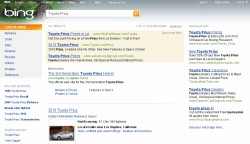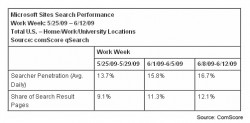Here’s a question I bet didn’t come up at the Social Recruiting Summit on Monday: Should I add my boss as a Facebook friend?
 What prompted this question (which I encourage you to comment on at the end of this article) is Hunch. That’s right, Hunch, a dot-com that launched out of beta on Monday. It’s not exactly a search engine. Nor is it an oracle. It’s, well, here’s how co-founder Caterina Fake explained it to CNN.com: “It’s something new.”
What prompted this question (which I encourage you to comment on at the end of this article) is Hunch. That’s right, Hunch, a dot-com that launched out of beta on Monday. It’s not exactly a search engine. Nor is it an oracle. It’s, well, here’s how co-founder Caterina Fake explained it to CNN.com: “It’s something new.”
We’ll call it a decision engine, since that’s what others are doing and it’s as good a descriptor as any. The first time you use Hunch, you’re confronted with 20 questions. More will come later, but Hunch starts easy. You can skip these profiling questions, but like talking with a shrink, any question you ask will be answered with several from Hunch.
When I asked Hunch about where to look for a job, it presented me a with a list of topics and question options including, “Should I look for a job or wait?” Not exactly what I was looking for, but interesting enough. The first question Hunch asked when I agreed to that topic was “Do you need the money?” After working my way through the decision tree, Hunch advised me to “wait a bit.” But the split between that answer and start looking was 55-45.
Besides being fun, Hunch has a serious side. Though it isn’t going to replace a search engine for sourcing candidates, it can help cut through the clutter to help you answer questions like “Do I need an in-house person for my U.S. business?” Or “Is it OK to ask my co-worker on a date?“
Ask it a more objective question and the answers are specific and immediately helpful. For instance, Hunch made four recommendations for website builders when it was asked what website builder to use. Rerunning the query, but answering the decision-tree questions a bit differently, produced two different recommendations among the four it offered.
The results would be even more customized if I had taken the time to open an account and answer a string of questions about myself.
 Now, if you’re not in the mood to bump about asking questions, but you still need answers, try Microsoft’s Bing. This is indubitably a search engine, even if Microsoft senior vice president Yusuf Mehdi told TechCrunch it is “more of a decision engine.” (Watch that phrase, it could become the “in” name for 2009.)
Now, if you’re not in the mood to bump about asking questions, but you still need answers, try Microsoft’s Bing. This is indubitably a search engine, even if Microsoft senior vice president Yusuf Mehdi told TechCrunch it is “more of a decision engine.” (Watch that phrase, it could become the “in” name for 2009.)
Setting Bing apart from other search sites, besides the spectacular home page photos, is the categorization that helps narrow down results. Searching for a Toyota Prius in the Web tab yields completely different results from Shopping. Not much of a big deal until you look off to the left navigation to discover that Bing is offering to skip right to “Reviews,” or “Recalls,” or “Dealers” or any one of five more topics.
I didn’t find candidate sourcing much different on Bing, though it was easier to cut through the duff. An especially handy feature are the expanded snippets for each of the search results that you can check with a simple mouseover. Between the search results and the abstracts it’s often not necessary to leave Bing to find something worth clicking into.
 Others are discovering Bing, as the Comscore traffic numbers show. Microsoft, with its tired old search engine, had about 9 percent of the search market at the end of May. That jumped up two points when Bing was introduced in the first week of June and the number continued to rise last week by almost another point.
Others are discovering Bing, as the Comscore traffic numbers show. Microsoft, with its tired old search engine, had about 9 percent of the search market at the end of May. That jumped up two points when Bing was introduced in the first week of June and the number continued to rise last week by almost another point.
Google is no doubt watching Bing closely. The New York Post reported the company had gone so far as to assemble a task force under the personal direction of founder Sergey Brin to decode the search engine. However, the company doesn’t have much to fear. Comscore, in another press release today, said 65 percent of all searches conducted in May were done on Google.
About that Facebook question. Hunch said don’t do it. What do you say?